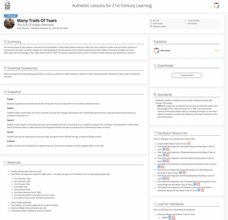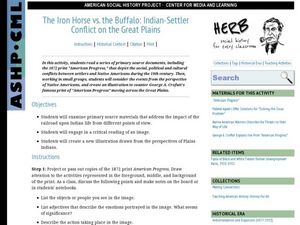K20 LEARN
Tribal Sovereignty and the Indian Reorganization Act: Tribal Governments
Sovereign nations or wards? High schoolers investigate the history of the Indian Reorganization Act and other legislation that impacted Native Americans. They also research different tribes' constitutions, compare them to the U.S....
K20 LEARN
Many Trails of Tears: The Era of Indian Removal
Cherokee, Chickasaw, Choctaw, Creek, and Seminole. All were forced off their ancestral lands in the southeastern United States as part of the Indian Removal Act of 1830. Young historians research the tribes' reactions to this removal and...
Smithsonian Institution
Borders within the United States: Indian Boarding Schools and Assimilation
Native American Nations ... sovereign entities or removable tribes? A thought-provoking instructional activity explores the relationship between Native American tribes and the United States, including forced assimilation and removal from...
Curated OER
Native American: Did All Indians Live in Teepees?
Clear up misconceptions about Native American dwellings. Not all Native Americans lived in teepees, show the class images and information about four different tribes that lived in very different homes.
Curated OER
Jacksonian America and the Indian Removal Act of 1830
Students utilize primary sources to explore the national climate concerning Native American Indians during the Andrew Jackson administration. They are presented with opinions for and against the Indian Removial Act of 1830 as they...
Curated OER
Native Americans of Our Region
Students describe the life of a Native American tribe native to their area. They form small groups and visit stations in the classroom to read about various Native American tribes. They write journal entries and draw pictures of the...
Curated OER
The Iron Horse vs. the Buffalo: Indian-Settler Conflict on the Great Plains
The Iron Horse encroached upon the land while conflicts escalated between Native Americans and the settlers. Sophomores study the print, American Progress then discuss how American progress affected Native Americans. They will study the...
Curated OER
First Meeting of the Indians and the Europeans
Your class hears a Native American Indian point of view of Europeans' arrival in Louisiana. They assess how cultural perspectives (especially an insider's view) and native language can shape a story. Each pupil identifies the...
Curated OER
The French and Indian War (1756 to 1763):
Take your class through the lead-up, strategies, and effects of the French and Indian War of the mid-18th century. The dynamics of American patriotism is put to the test in the vital years before the American Revolution, and the ongoing...
Curated OER
Kumeyaay Indians
Useful for literary analysis, citing textual evidence, or summary skills, this lesson about the Kumeyaay Indians would be a good addition to your language arts class. Middle schoolers read novels and summarize the literature in their own...
Curated OER
Indian Rangoli Patterns
Kids learn about the beautiful design work called Rangoli. Rangoli is a symbolic, geometric design drawn on the floor in Indian homes intended as a welcome to gods and guests alike. They'll learn about the tradition, view examples of the...
Alabama Department of Archives and History
Conflict in Alabama in the 1830s: Native Americans, Settlers, and Government
To better understand the Indian Removal Act of 1830, class members examine primary source documents including letters written by Alabama governors and the Cherokee chiefs. The lesson is part of a unit on the expansion of the United...
Smithsonian Institution
We Have a Story to Tell: Native Peoples of the Chesapeake Region
How did colonial settlement and the establishment of the United States affect Native Americans in the Chesapeake region? Your young historians will analyze contemporary and historical maps, read informational texts, and work in groups to...
Curated OER
Chitimacha Indians in Louisiana
Your class will discover important facts about the Chitimacha Tribe of Louisiana in this in-depth PowerPoint. They gain knowledge about their heritage through facts and pictures. For a quick assessment, there are eight short answer...
Curated OER
Trade Spreads Indian Religions and Culture
India's religion and cultural practices spread as trade and desire for their resources increased. Examine the shifts in Buddhism, Hinduism, and regional cultures that came with the spread of Indian trade. This presentation could be an...
National Endowment for the Humanities
Empire and Identity in the American Colonies
The American Revolution was born out of a European conflict that spilled over into North America—and the documents prove it! Using primary sources from the era of the French and Indian War, including British plans to try to unite its...
Curated OER
The First Americans
Third graders explore American history by researching Native Americans. In this American settlers lesson, 3rd graders research the Native American Woodland Indians and define the actions they took when faced with the European settlers....
Curated OER
Virtual Winter Count
Learn more about the North American Plains Indian tribes and their unusual methods of recording historical events. Learners examine the winter count, a custom by which these groups illustrated information after each winter passed. They...
Smithsonian Institution
Western Indian Wars
Why do many Native Americans live on reservations? An interactive resource teaches about how reservations came to be and the tragic history behind Native Americans moving from their lands. Teenagers read passages, view images, and click...
Curated OER
The Economienda System
Explore the Economienda System common in Latin America during the 1700s. The class will read the included text, answer 3 critical-thinking questions, and fill out a pie chart showing the demographics of the time. They will learn about...
Smithsonian Institution
Eastern Indian Wars
Many know that Native Americans were forced off their lands and moved west, but how did these people react? The Red Sticks faction of the Creek nation opted to defend themselves and their lands in a series of wars called the Eastern...
Curated OER
Natives of Indiana
Fourth graders participate in discussions about the Native Peoples who inhabited what is now Indiana. In this Native American lesson, 4th graders discuss the social and cultural structures of these Native Americans. They locate the...
Curated OER
Indian Removal
Students discuss how the various acts used to force Native Americans from their home. Using the Internet, they compare and contrast the policies toward the Native Americans by presidents through Jackson. They evaluate the impact of...
Curated OER
Native American Clay Pots
Students explore world culture by conducting an art project in class. In this Native American culture lesson plan, students identify the types of materials American Indians utilized in their artistic endeavors, specifically clay....
Other popular searches
- Native American Indians
- Art Native American Indians
- Native American Indians Nj
- Native American Indians 4th
- Native North American Indians

























